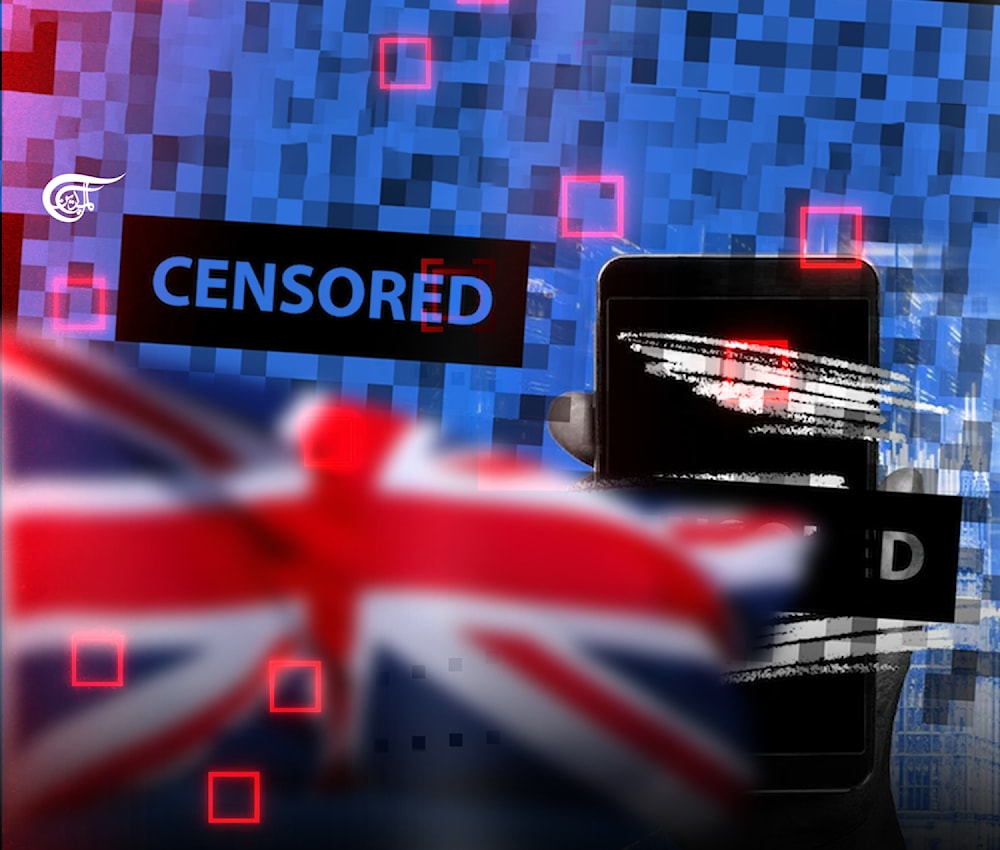British Media Censorship Unit Targets Big Tech
The DSMA Committee is a little-known, rarely discussed body, which has a devastating impact on what the British public is permitted to know.
-

The DSMA Committee has had its eye on social media giants for many years (Illustrated by Hadi Dbouk to Al Mayadeen English)
On February 27th, Politico revealed that the “top secret” Defence and Security Media Advisory (DSMA) Committee - “Britain’s media censorship board” - is “trying to woo Big Tech”. This is a deeply disturbing but completely inevitable development, as London continues its unrelenting crusade to globally export its culture of state secrecy, the Western world’s most intensive and draconian, in the face of sharply rising dissent at home and abroad.
The DSMA Committee is a little-known, rarely discussed body, which has a devastating impact on what the British public is permitted to know. Under its auspices, representatives of London’s major media outlets and press associations meet with officials drawn from the security and intelligence services, military, and government, to discuss what subjects and events can be reported on, and how.
The Committee also regularly dispatches “D-notices” to editors and journalists, if a story has been published, or is about to break, which contains information the British government does not want in the public domain. As Politico notes, they are theoretically “advisory…requests for publications to voluntarily withhold details.” Yet, journalists know they could be prosecuted if they fail to comply. If not, they may at least be blacklisted, or lose access to on- and off-the-record briefings, interviews, and privileged information from officials.
Accordingly, D-notices are broken vanishingly rarely. A palpable example of the system’s brutal efficacy came in November 2010, when a D-notice was issued following WikiLeaks’ release of US State Department cables. The overwhelming majority of the British media resultantly ignored their explosive contents. The same thing happened in June 2013, when The Guardian began publishing stories based on material leaked by NSA whistleblower Edward Snowden. Not a single British newspaper, bar The Independent, mentioned the seismic global scandal.
Politico reports that in recent years, the Committee has “set its sights on luring Big Tech to the table,” and is “eager to somehow apply the D-notice regime to the wider internet…in recognition of a fast-evolving online news landscape.” Committee notice secretary and British Army veteran Geoffrey Dodds tells the outlet “we’ve been trying to break into the so-called tech giants,” and they have been engaged for some time in outreach efforts with companies including Google and Meta.
Presently, governments can request social media platforms to remove content if it violates local laws, or platform rules. The Committee wants to go much further, compelling tech firms to voluntarily monitor their platforms for content that might be covered by D-notices, and seek DSMA advice on whether to censor it. The reliably righteous TechDirt viciously slammed this proposal:
“Yet another suggestion from someone who’s never worked in the field of content moderation that tech companies can always do more to proactively vet content that’s uploaded by the gigabyte every second on behalf of hundreds of government agencies that all want something different monitored on their behalf.”
It’s certainly true US tech firms are a very different beast to British “journalists”, who, according to figures cited in Ian Cobain’s 2016 book The History Thieves, voluntarily submit 80 - 90% of stories they suspect could be of interest to the DSMA Committee for official examination, and potential censorship, in advance of publication. Yet, as we shall see, the Committee is absolutely determined to bring US social media firms to heel, by hook or by crook.
‘Do Not Amplify’
The DSMA Committee has had its eye on social media giants for many years. Yet, in a bitter irony, attempts to lure Facebook and Twitter et al into its censorship fold have so far failed miserably. Dodds lamented how tech giants “won’t have anything to do with us at the moment for their own reasons,” and expressed hope future state regulation of Big Tech “could create potential leverage” for the Committee to exploit:
“I suspect the UK government has got to come up with a grand bargain with the tech giants before they’ll come down to the types of security we’d advise. We’re waiting for that to happen…then hopefully, we’ll be able to get the tech giants back on board.”
Dodds refers here to how Google was once a member of the Committee, but left after the Snowden revelations, which exposed widespread collusion between Big Tech and Western spying agencies, involved in unlawful mass surveillance operations. He goes on to complain that the company felt it was unable to sit on the Committee “because it was too linked to government,” despite the body being “independent, voluntary, non-statutory.”
This characterisation is, to say the least, laughable. As Politico notes, the DSMA Committee “is currently run by the Ministry of Defence’s director general for security policy,” includes members hailing from every major British government agency and department, and its meetings take place in Ministry of Defence HQ. Moreover, the group celebrates with an annual dinner at an official British Army club, while “perks for media members include organized tours” around the offices of MI5, MI6 and GCHQ.
The Committee’s ostensible non-governmental status nonetheless handily “shields it from freedom of information laws.” Still, minutes of its meetings are openly published, and frequently contain tantalising excerpts. Records of a November 2019 summit contain a dedicated section on “contacts with social media platforms,” which notes the DSMA’s efforts to “engage” tech giants “had come to nothing.” It was nonetheless felt necessary to “keep up the pressure,” perhaps in liaison with the British government’s Department for Digital, Culture, Media and Sport (DCMS).
Undeterred by repeated spurning by Big Tech, the DSMA Committee subsequently investigated other means of extending its tendrils online. Minutes from November 2022 show members proposed cultivating an “informal, arms-length relationship” with British broadcasting regulator OFCOM, which has recently taken on a new role enforcing the highly controversial Online Safety Act, which became law in October 2023, and critics charge kills end-to-end encryption dead. Such a bond would allow for insidious British state censorship of social media:
“Because OFCOM may in the future have regulatory duties relating to the prominence and ranking of online content, an arms-length relationship with OFCOM might potentially offer the Committee the opportunity to influence the very largest digital platforms to ensure their algorithms do not amplify articles which may damage national security.”
‘Strict Scope’
Such excerpts are deeply concerning, given the DSMA Committee’s eagerness to expand its powers far beyond its official purview, in every direction. Independent citizen journalism, which has expanded exponentially in recent years via social media, is in its crosshairs. Minutes of an April 2023 meeting show that the Committee successfully pressured a journalist not to publish information about a “small” British Army unit “about to deploy on operations overseas,” in an unstated country.
The journalist complied, but pointed out the presence of British forces in the region “was widely known” in the country itself, “was part of a very large international coalition effort, and there was open source evidence to prove it.” As such, “the availability online of commercially available overhead imagery as well as photographs and videos with tracking data meant information previously the preserve of national intelligence effort was freely available to all in real time.”
The Committee despaired that, unlike a citizen observer, “the professional journalist was both trained and committed to standards of truth and even-handedness by which the amateur was not bound.” This is a euphemism for the journalist in question being sufficiently servile to contact the Committee before publishing, and knowing that the penalty for publishing this information could be prosecution under the Official Secrets Act and recently enacted National Security Act.
As this journalist has detailed, the latter is gravely disturbing legislation, with wide-ranging consequences for free speech. The Act introduces a number of completely new criminal offences with severe penalties, and its terms are so broad and nebulous, citizens will almost inevitably break the law without wanting to, intending to, or even knowing. If the Committee continues to get nowhere with Big Tech, it could well begin reaching out to social media users, asking them politely to remove content.
Little will they know failure to comply with the Committee’s “advisory” directives will likely land them in jail. And it’s not merely open source information that the Committee is seeking to suppress online, but “disinformation”. Records of its May 2022 meeting indicate its Chair “raised the issue of Russia’s unprovoked war with Ukraine and its use of misinformation/propaganda,” despite acknowledging “information warfare did not fall within the strict scope of the Committee’s remit.”
A similar determination is evident in the Committee’s push to infiltrate social media. Politico’s investigation chillingly concludes that “regardless of the tech firms’ lack of cooperation to date, the Committee remains steadfast in its aims. As the media landscape evolves,” Dodds declared:
“There’s probably going to be less print, just as much broadcasting, and a continued increase in social media and online [news]. So we need to get into this game.”

 Kit Klarenberg
Kit Klarenberg
 9 Min Read
9 Min Read











